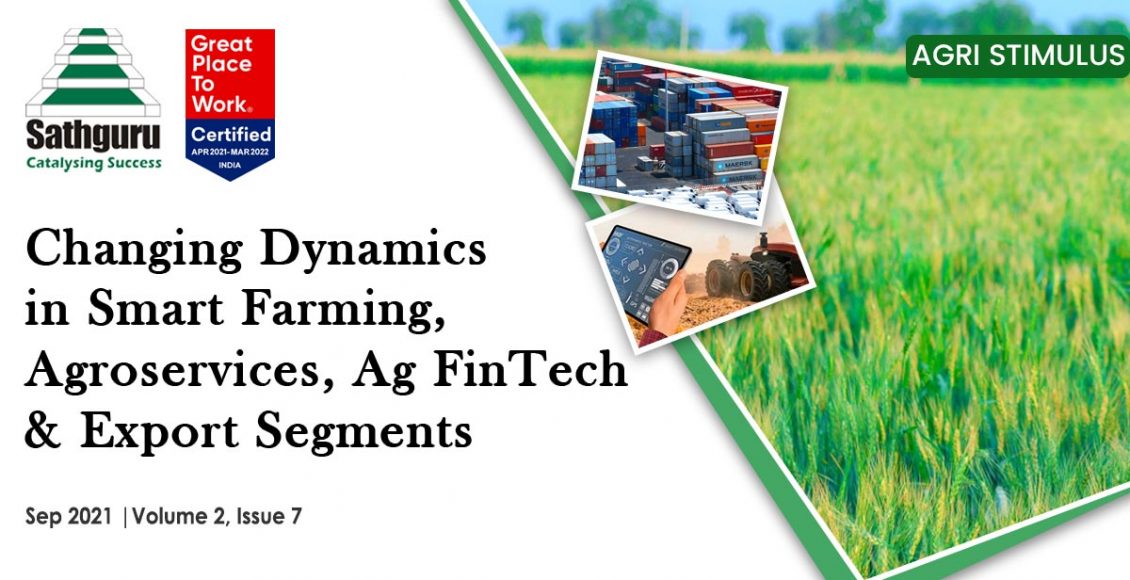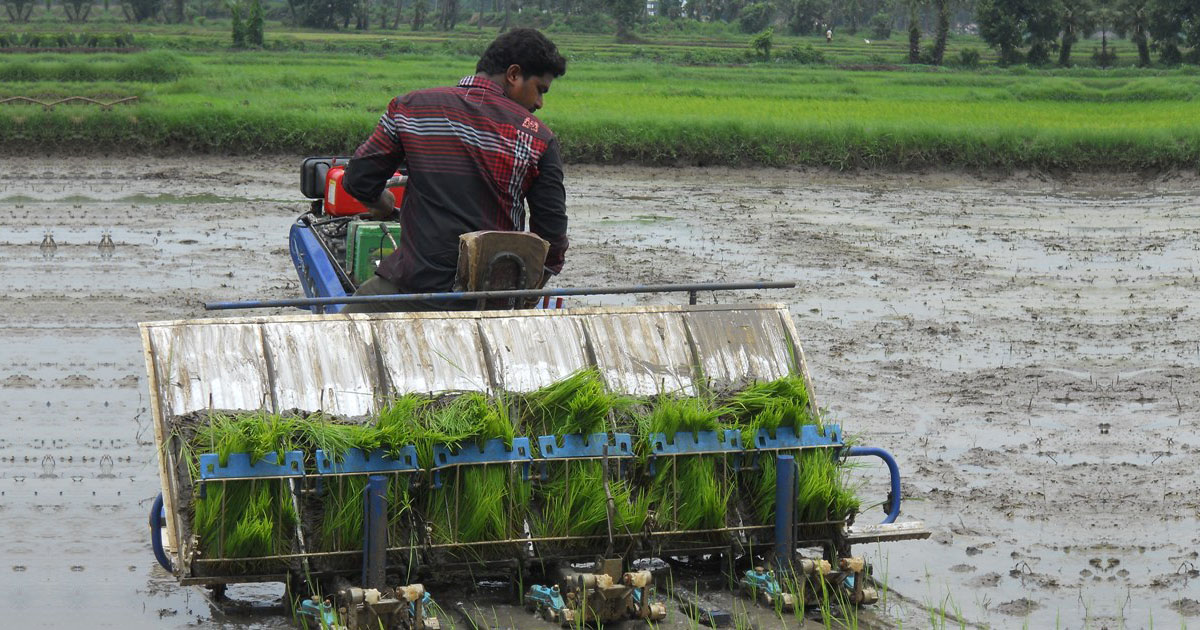
Big Data for climate smart agriculture: A potential not fully realized in India
Advances in Agri-FinTech Ecosystem and policy interventions are important to fund credit and risk in agriculture
Agri services – Addressing the Needs of Smart Agriculture
360 0Approach Unfolding Umpteen Opportunities in Agri Exports
Hub for FPOs launched at Centre of Excellence:
Tata-Cornell Institute (TCI) for agriculture and nutrition created a hub for FPOs with grant funding of $1 million from the Walmart Foundation. The hub features a first-of-its-kind database of Indian FPOs and serves as a repository of learnings, information, and knowledge for the advancement of FPOs in India. The database also allows researchers to develop models for increasing the well-being of smallholders.
Read More
Standards to be developed for fortified rice kernels (FRKs) - FSSAI:
Food Safety and Standards Authority of India (FSSAI) is considering developing standards for fortified rice kernels. The food safety authority aims to bring this regulation to provide consumers with vital information on parameters such as total sugar, sodium, saturated fat, and calories, in a simple manner, on packaged food and beverage labels. These standards ensure that the quality of FRKs is maintained and blending efficiency is achieved.
Read More
The country’s first non-GM herbicide-tolerant rice varieties released:
The two new varieties of rice, Pusa Basmati 1979 and Pusa Basmati 1985, developed by the Indian Agricultural Research Institute (IARI), through mutation breeding, were released by Prime Minister Narendra Modi. These varieties can be direct seeded and can save water and labor compared to conventional transplanting. The varieties contain a mutated acetolactate synthase (ALS) gene that allows farmers to spray Imazethapyr, a broad-spectrum herbicide, to control weeds.
Read More
Bayer to expand vegetable seed offerings:
Bayer to expand its vegetable seeds offerings by including organically produced seed for three key crops, tomato, sweet pepper, and cucumber, for the greenhouse and glasshouse market. The launch is scheduled for 2022 in Canada, the US, Mexico, Spain, and Italy, with potential future expansion. Tomato rootstock varieties will follow these in 2023. Varieties will be sold under both the Seminis® and De Ruiter® vegetable seed brands.
Read More
ICAR developed 35 crop varieties dedicated to the nation:
The crops with special traits developed by the Indian Council of Agriculture Research (ICAR) address the challenges posed by climate change and malnutrition. These crop varieties include Double Zero Mustard 33, first Canola quality hybrid RCH 1, drought-resistant chickpea, wilt and sterility mosaic resistant pigeon pea, early maturing variety of soybean, disease-resistant varieties of rice, and biofortified varieties of wheat, pearl millet, maize, and chickpea, quinoa, buckwheat, winged bean, and faba bean, sorghum, and baby corn, etc.
Web-version of e- Gopala launched to support dairy farmers :
National Dairy Development Board (NDDB) launched the web version of the e- Gopala application to benefit dairy farmers. The i-MAP web portal was also launched that provides real-time information to dairy farmers for better productivity of dairy animals. The e-Gopala app would help livestock owners to choose advanced livestock and provide information related to productivity, health, and diet to the cattle owners.
Read More
MPEDA focuses on value addition in fish exports to double producer’s income:
Marine Product Export Development Authority (MPEDA), has emphasized the need to focus on development of cutting-edge technologies and capacity building measures to promote value addition in fisheries that will further lead to enhancement in producer’s income and help India capitalize the existing share of fish exports efficiently.
Read More
Big Retail and tech giants signs MOU with GoI to build national farmers’ database:
Through pilot project major retail and tech giants such as Amazon, Microsoft and others will be harnessing data from Indian farmers under government’s vision to boost rural incomes, promote digitization in agriculture as well as leverage the data in making crucial policy and regulatory related decisions
Read More
An Indian agtech firm develops rapid testing system of curcumin in turmeric:
A well-recognized Punjab based agtech firm-AgNext develops a rapid testing device for detection of curcumin in turmeric within 60 seconds, thereby addressing the prevalent lengthy testing lab methods of the country. The firm plans to set up the platform at the Agricultural Market Committee (AMC) in Nizamabad, Telangana.
Read More
Recent developments for pulses market is all set to bring revolution in India:
Developments in pulses segment is majorly driven by strong R&D initiatives such as 71 bio-fortified crop varieties and 35 climate-resilient crop varieties development and efforts to strengthen the agri infrastructure, market linkage of pulses in the country.
Read More
Cargill launches 'Digital Saathi'- First local online service platform in 5 major Indian districts:
Digital Saathi launhed by Cargill aims to provide digitally enabled agriculture advisory services and enhanced market access to smallholder farmers based in 5 districts of Karnataka including Davangere, Bellary, Haveri, Chitradurga and Shimoga.
Read More
Farmers from Meerut, UP join in to spray crops using drones and reduce toxic exposure:
These drones are being promoted by SVBPAU through field demonstrations is expected to help farmers in wider pesticide applications and mitigate health risks faced due to exposure to toxic chemicals. 700 ml per acre of pesticide is required for conventional applications, drones, while with drones only half the amount is required. The high cost of the equipment currently is being shared jointly by group of farmers.
Read More
New gene identified for drought resistance in rice with highly branched root system:
Researchers from DA-PhilRice, Philippines in association with Nagoya University, Japan have discovered a wavy root elongation growth 1 (weg1) gene from mutants of a rice variety called Taichung 65. The gene enables the rice plant with highly branched root system to explore its underground environment for water and nutrients. This helps in maintaining productivity even under drought condition especially rainfed lowlands.
Read More
“Genes of importance” in agriculture revealed using Machine Learning:
Research shows that altered gene expression in Arabidopsis or corn could increase plant growth in low nitrogen soils. Nitrogen a key fertilizer component and crucial nutrient for plants. As a proof of concept it was demonstrated that genes whose responsiveness to nitrogen are evolutionary conserved to these two diverse plants – have significantly improved the ability of machine learning models to predict genes of importance for how efficiently plants use nitrogen.
Read More
Authors




Connect with Authors at: E-mail agribusiness@sathguru.com
 Grow Beyond
Grow Beyond 






